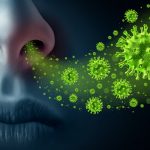Mind and Body
Recently (January 13th), I was interviewed on the Health Trends Show on AdviceRadio.com. The focus of the interview was the connection between the mind and body. The interview reminded me that one of the most important chapters in Lessons from the Miracle Doctors(and probably one of the most ignored) is Chapter 15, The Thought that Kills.
For years stress and/or depression have been suspected of somehow increasing the risk of contracting numerous infectious diseases. In addition, there is mounting statistical evidence that increased levels of stress and depression also correlate with an increased incidence of cancer. There is even strong statistical evidence linking stress and depression with death itself. In fact, there is now a field of research called psychoneuroimmunology (complete with its own organization and website) that is dedicated to unlocking the connection between our thoughts (i.e. our nervous systems) and our immune systems.
Researchers have discovered several key links between these systems:
- For one, we know that when we are stressed, our bodies produce more adrenaline and cortisol. And while it is true that these hormones help mobilize the body’s energy reserves to aid in dealing with the stress, this “service” does not come free of charge. Your body has a finite amount of resources, and when the resources allotted to stress are increased, they must correspondingly be decreased someplace else, and that someplace else is your immune system. As the output of adrenaline and cortisol are increased, the body compensates for the energy expenditure by decreasing the amount of energy available to your immune system. As a result, the number of antibodies in your immune system drop and both the number and strength of lymphocytes in your immune system also diminish.
- We have also learned that the brain is directly wired to the organs of the immune system (the spleen, thymus, lymph nodes, and bone marrow) and that stress and depression affect their performance.
- But most interesting of all is the connection between the neuropeptides produced by brain cells and the rest of the body. In much the same way that the immune system uses the interleukins to communicate with itself, the brain uses the hormone-like neuropeptides to communicate with itself and the rest of the body, including the immune system. When we are happy, for example, the brain produces one kind of neuropeptide. The cells of the immune system have specific receptor sites for these “up” chemicals. Once received and locked into the receptor sites, these neuropeptides literally cause the cells of the immune system to strengthen and build. Correspondingly, when we are depressed, we produce a different set of neuropeptides. Immune cells also have specific receptors for these “down” communicators, whose net effect on the immune system is to shut it down.
Incidentally, this is by no means a one-way communication. The cells of the brain have receptor sites for the interleukins and interferon produced by the lymphocytes of the immune system. That’s right. It turns out that some macrophages and activated lymphocytes actually are capable of producing their own neuropeptides to communicate directly back to the brain in its own language. The communication is bi-directional, constant, and total.
This is truly revolutionary information.
Basically, through both our nervous systems (direct wiring) and our circulatory systems (hormones and neuropeptides), our minds interact with every organ, system, and cell in our bodies, affecting the performance, functioning, growth, and repair of our:
- Immune systems
- Bones
- Bone marrow
- Glands
- Heart (everything from heart rate to the heart tissue itself)
- The walls of our veins and arteries
- The functioning of individual cells in the body
- Even the very structure of our DNA
The entire body is literally created and run by the brain — with equal input back from the organs and cells themselves, again through both the direct wired connections of the nervous system and the neuropeptides and hormones traveling through the circulatory system. The net result is that in addition to what medical researchers have been able to verify and explain, there are a number of “incidents” that hint at so much more.
- A group of medical researchers in Montreal tracked 222 post heart attack victims, both men and women. The researchers found that those who were depressed (who felt sad, hopeless, and listless) were more likely to die of another heart attack within 18 months of their first heart attack than those who were not — 10 times more likely, in fact.
- The January 95 issue of the American Journal of Medicine reported on a study of patients with a history of heart disease that found that those who were depressed were eight times more likely to develop potentially deadly heart rhythms than those who were not depressed.
- A ten-year study was conducted to follow the mortality rates of people who had experienced stroke. Those who had been diagnosed with either major or minor depression were 3.4 times as likely to have died within the follow-up period. The death rate among depressed patients with few social contacts was especially high — over 90%!
- In a study of 194 heart attack patients, those who reported lower amounts of emotional support were nearly 3 times more likely to die within 6 months than those with higher levels of emotional support.
And then there is one of my favorite statistics. Have you ever wondered when most people die? Statistically, it turns out that people are more likely to die on Monday morning before going to work than at any other time of the week. There has been much speculation as to why this happens; but in general, most people agree it’s something along the lines of: “Most people have heart attacks on Monday morning, because they are stressed that they are heading back to jobs they can’t stand after a weekend off.”
Stress
Stress is your body’s response to all of the demands made upon it. Your body responds to all stresses, both positive and negative, by trying to get back to normal.
- 43% of all adults suffer adverse health effects due to stress.
- 75-90% of all visits to primary care physicians are for stress-related complaints or disorders.
When a stressor is perceived, the hypothalamus triggers your adrenal glands to release corticosteroids to increase metabolism to provide an immediate increase in energy. Simultaneously, your pituitary releases a hormone called ACTH, which causes your adrenal glands to release epinephrine and norepinephrine, which work to prolong your body’s fight-or-flight response.
If a stressful situation goes on for too long without any relief, you may feel tired, irritable, depressed, or anxious. You may have trouble sleeping or eating, or you might experience diseases and disorders, such as headaches, insomnia, high blood pressure, and cardiovascular and kidney diseases, colds, ulcers, asthma, heart attack, and/or stroke.
- Stress has been linked to all the leading causes of death, including heart disease, cancer, lung ailments, accidents, cirrhosis, and suicide.
- Stress is said to be responsible for more than half of the 550 million workdays lost annually because of absenteeism.
Eventually, your body’s energy reserves are exhausted; it breaks down. Recent research has confirmed the role of stress in cardiovascular disease, cancer, gastrointestinal, skin, neurologic and emotional disorders, and a host of disorders linked to immune system disturbances, ranging from the common cold and herpes, to arthritis, cancer, and AIDS.
Depression
Depression works on your body in different ways than stress, but the results are the same.
Your body is a product of your thoughts. As we mentioned earlier, the cells of your body have receptor sites for the various neuro-hormones you produce. Your immune cells, to use just one example, have receptor sites for each of those bio-chemicals. When you are happy, you produce a set of neuro-hormones that are picked up by the cells of your immune system. These particular neuro-hormones tell your immune system to jack up — which it does. In other words, happy thoughts improve your health. However, when you are depressed, the opposite happens. The neuro-hormones your body produces literally shut down your immune system. In effect, negative thoughts can actually kill you.
The Pharmaceutical Solution
Prozac
The major pharmaceutical companies, as usual, have developed a set of drugs called selective serotonin reuptake inhibitors (SSRIs) to “manage the symptoms” associated with stress and depression. You might know them as Prozac, Zoloft, Paxil, Luvox, Celexa, Effexor and Serzone.
Thanks to millions and millions of dollars in promotion, some misguided books that jumped on the bandwagon, and our own marvelous tendency to believe in magic bullets, we have become a “Prozac Nation.”
But not without cost.
- SSRIs cause mania and delusions of grandeur in one out of every 25 children taking the drugs.
- A tendency to violence has been reported in 1 out of 16 Prozac users.
- In 70% of all murder/suicides involving women and children, the women were on SSRIs.
Conclusion
During the interview, I was asked if I thought all illness was created first in the mind. My response is that although on a metaphysical level, you might be able to make that case, in practical terms it doesn’t really apply. For example, it’s hard to ask a baby born with a serious illness, “Why are you making yourself sick?” Yes, there is a direct connection between the mind and the body, and the mind certainly influences the health of the body, but it is by no means the sole arbiter of disease. The connection is not that simple — and in fact, the body is as likely to influence the mind, as the mind the body. Nonetheless, we are left with the fact that what we think (and how we think) does absolutely (and unequivocally) affect our health. Or as Dr. John Christopher, one of America’s foremost naturopaths, was fond of saying, “Most people need a colonic between the ears.”
The bottom line is that if you want to make your mind your partner in health, you need to work at it. It takes work to move your mind out of stress and/or depression.
The entire Baseline of Health® program is obviously beneficial.
- If you are constipated, it makes you feel “off.” Feel “off” long enough, it leads to depression.
- If you are undernourished, it leaves you feeling exhausted. Prolonged exhaustion not only leads to depression, it stresses the body.
- Excess free radicals stress the body, and in a marvelous feedback system that very stress creates a cascade of ever increasing free radicals.
- Hormonal imbalances stress the body.
- Exercise creates happy biochemicals that relieve stress. (But of course, too much exercise increases stress.)
- Etc.
The bottom line is that you’re only as strong as your weakest link so you need to do it all to overcome stress and depression.
On the other hand, everyone wants the quick fix. So while you’re doing the Baseline of Health® and rebuilding yourself from the ground up, here are five steps to help you begin the process.
- Learn to Meditate. If nothing else, just try watching your breath. Sit down. Keep your back straight. Close your eyes and watch your breath. Watch as your breath goes in and your lungs fill. Watch as it goes out and your lungs empty. Don’t force; just watch.
- Learn to Visualize. After you’ve meditated for a few minutes and calmed down, practice a visualization. See your body as made of healing light. Imagine the light penetrating and healing every cell in your body. If you are sick, focus the light on the diseased area.
- Practice Affirmation. What we say matters. We all know, for example, someone who uses the word “afraid” all the time. As in:
- “I’m afraid I won’t be able to go tonight.”
- “I’m afraid I’ve eaten too much; I’m absolutely stuffed.”
- “I’m afraid I’m almost out of gas.”
- etc.
Is it any wonder that eventually they’re afraid all the time? And then there are the examples that Dr. Bernie Siegal includes in his book Love, Medicine, and Miracles, such as:
- The man who said “he was always considered spineless” and in the end developed multiple myeloma in his backbone to support his contention.
- Or the woman who had had a mastectomy who told Dr. Siegel that she “needed to get something off her chest.”
It’s simple. Instead of being controlled by the things we say, instead of having our health compromised by idle words, we should put words to work for us. Try repeating to yourself over and over with each step you take when you walk, or while you’re driving something like:
- “I’m joy. I’m peace. I’m health. I’m light.” Or make up your own. If so, make it short and rhythmical, so it sort of says itself to a walking cadence. It really does work magic. I once hiked the full length of the John Muir Trail, about 237 miles, silently reciting a similar affirmation every single step of the way. By the end of the trip, I had repeated the affirmation something over 500,000 times — and I was sailing up and down over 10,000 ft. passes and up and down the 15,000 feet of Mt. Whitney.
- Take an herbal break. Use an herbal nerve-tonic formulation that contains herbs such as Valerian Root, Kava kava, Passionflower, Hops, Black cohosh, St. John’s wort, and Lobelia.
- Nutraceuticals such as SAMe, 5-HTP, and L-Theanine can all help reduce stress, depression and anxiety.
Incidentally, you can listen to the entire interview on the Mind Body Connection, and several others, on the Radio & Broadcast section of this site.











Thank You!
Thank You!